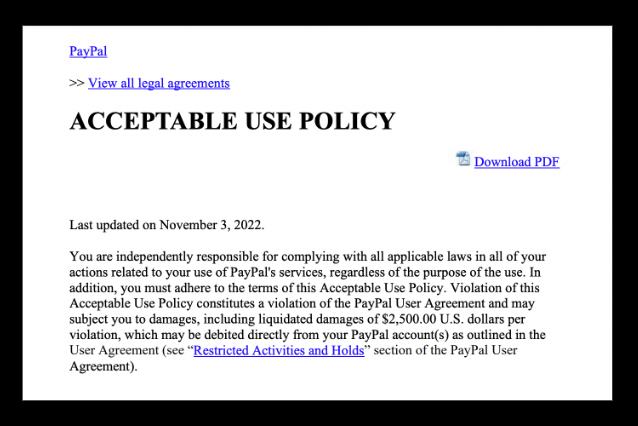Table of Contents
Recently PayPal updated its terms and conditions. So what? you ask. Well, about that.
On the heels of its censorship spree in the UK – that received backlash so great it got the attention of lawmakers – PayPal is rolling out a new agreement that gives itself more censorship powers and the ability to strip income from those who don’t abide to its speech rules.
Violation of the “Acceptable Use Policy constitutes a violation of the PayPal User Agreement and may subject you to damages, including liquidated damages of $2,500.00 US dollars per violation,” PayPal writes.

[…] The updated policy prohibits users from using PayPal for activities that:
“Involve the sending, posting or publication of any messages, content or materials that, in PayPal’s sole discretion, (a) are harmful, obscene, harassing or objectionable … (e) depict, promote, or incite hatred or discrimination of protected groups or of individuals or groups based on protected characteristics (eg race, religion, gender or gender identity, sexual orientation, etc) … (g) are fraudulent, promote misinformation … or (i) are otherwise unfit for publication.”
The key phrases here “sole discretion” and “unfit for publication” mean that PayPal gets to decide what is and what is not “unfit for publication”.
[…] Backlash at PayPal in the last week caused it to backtrack on its censorship of the Free Speech Union, its founder Toby Young and his news website the Daily Sceptic after pushback from both sides of the British political spectrum.
Critics argued that the removal of the accounts was view-point discrimination.
[…] After the accounts were removed, a spokesperson for the financial services provider said: “Achieving the balance between protecting the ideals of tolerance, diversity and respect for people of all backgrounds and upholding the values of free expression and open dialogue can be difficult, but we do our best to achieve it.”
Translation: We will do our best to be as woke as we can.
PayPal was accused of ignoring the fact that defending someone’s right to free speech is not the same as promoting their views.
“Forgive me if I don’t leap for joy,” Young told the Telegraph after the accounts were reinstated. “The last two weeks have been a nightmare as I’ve scrabbled to try to stop the Daily Sceptic and Free Speech Union going under. PayPal’s software was embedded in all our payment systems, so the sudden closure of our accounts was an existential threat.”
There’s all kinds of wrong here. PayPal has every right, within the law, to decide who they’re going to do business with and who not. What they don’t have the right to do is act in way that causes damage, such as closing accounts of clients when the client is relying on the account for payments.
It’s also difficult to see how any violation could cause damage to PayPal. Maybe they’re afraid they’d be subjected to the wrath of some social justice warrior.
But the important thing to remember is this: If you rely on PayPal to get paid, PayPal can close your account for any reason they see fit and there’s nothing you can do about it except sue. And that can get rather expensive.









